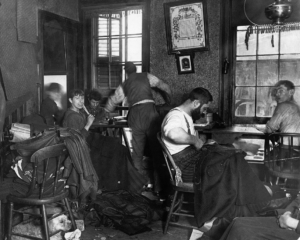This is an archive of prayers and song composed for, or relevant to, International Workers’ Day, a civic day celebrating laborers and the working classes. Promoted by the international labor movement, the civic day occurs every year on 1 May, coinciding with the European spring festival of May Day. The International Workers Congress held in Paris in 1889 established the Second International for labor, socialist, and Marxist parties and adopted a resolution for a “great international demonstration” in support of working-class demands for the eight-hour work day. The date had been selected by the American Federation of Labor to commemorate a general strike in the United States, which had begun on 1 May 1886 and culminated in the Haymarket affair on 4 May. The demonstration subsequently became a yearly event. The 1904 Sixth Conference of the Second International, called on “all Social Democratic Party organizations and trade unions of all countries to demonstrate energetically on the First of May for the legal establishment of the eight-hour day, for the class demands of the proletariat, and for universal peace”. If you have composed a prayer for International Workers’ Day, please share it here. Filter resources by Collaborator Name Filter resources by Tag Filter resources by Category Filter resources by Language Filter resources by Date Range
A worker’s prayer by Rabbi Stephen Belsky, dedicated to Noam Ezra ben haRav Moshe z”l. . . . Categories: Tags: Contributor(s): This is a petition for the worker in the style of “Av Haraḥamim” and similar texts, using Biblical and Mishnaic language and co-opting it into a new meaning. It could be read after the Torah service (like many other petitionary texts) or focused on in private. The Biblical relationship between God, humanity, and labor is fascinating. Often it is treated as a curse placed upon us, and just as often as the purpose of humanity. In Genesis 3:19 it is the curse placed upon a disobedient First Adam, but less than a chapter earlier in Genesis 2:15 it is the reason for First Adam’s creation in the first place! In the past century or so, traditional Judaism has somewhat tilted away from the ideas of worker’s rights so clearly stated in the Tanakh and in rabbinic texts. Partially this was to disassociate from the Bundists, partially out of fear of “looking too Communist” in a xenophobic American society, and partially because the Jewish working class is nowhere near as substantial a part of the community as it once was. If this text is meant to do anything, it’s to show that love of God and love of the worker aren’t opposed to each other – in fact, they go hand in hand! . . . Categories: Tags: Contributor(s): |



